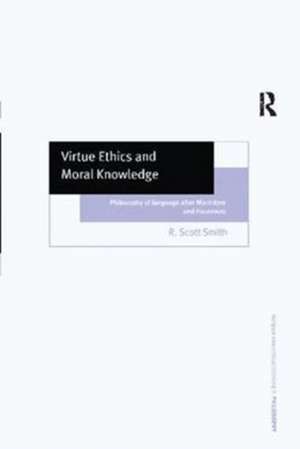Virtue Ethics and Moral Knowledge: Philosophy of Language after MacIntyre and Hauerwas: Ashgate New Critical Thinking in Philosophy
Autor R. Scott Smithen Limba Engleză Paperback – 16 mai 2017
| Toate formatele și edițiile | Preț | Express |
|---|---|---|
| Paperback (1) | 299.25 lei 6-8 săpt. | |
| Taylor & Francis – 16 mai 2017 | 299.25 lei 6-8 săpt. | |
| Hardback (1) | 739.02 lei 6-8 săpt. | |
| Taylor & Francis – 28 feb 2003 | 739.02 lei 6-8 săpt. |
Din seria Ashgate New Critical Thinking in Philosophy
-
 Preț: 463.30 lei
Preț: 463.30 lei -
 Preț: 489.26 lei
Preț: 489.26 lei -
 Preț: 489.26 lei
Preț: 489.26 lei - 25%
 Preț: 324.16 lei
Preț: 324.16 lei - 16%
 Preț: 338.33 lei
Preț: 338.33 lei - 15%
 Preț: 444.10 lei
Preț: 444.10 lei - 18%
 Preț: 997.38 lei
Preț: 997.38 lei -
 Preț: 469.34 lei
Preț: 469.34 lei -
 Preț: 469.34 lei
Preț: 469.34 lei - 16%
 Preț: 299.06 lei
Preț: 299.06 lei -
 Preț: 469.34 lei
Preț: 469.34 lei - 17%
 Preț: 233.51 lei
Preț: 233.51 lei -
 Preț: 469.34 lei
Preț: 469.34 lei - 26%
 Preț: 765.04 lei
Preț: 765.04 lei -
 Preț: 489.26 lei
Preț: 489.26 lei -
 Preț: 469.34 lei
Preț: 469.34 lei - 26%
 Preț: 736.69 lei
Preț: 736.69 lei -
 Preț: 389.38 lei
Preț: 389.38 lei - 18%
 Preț: 1000.27 lei
Preț: 1000.27 lei -
 Preț: 469.34 lei
Preț: 469.34 lei -
 Preț: 469.34 lei
Preț: 469.34 lei - 26%
 Preț: 764.20 lei
Preț: 764.20 lei - 13%
 Preț: 338.33 lei
Preț: 338.33 lei - 17%
 Preț: 338.33 lei
Preț: 338.33 lei - 12%
 Preț: 312.43 lei
Preț: 312.43 lei - 18%
 Preț: 1000.27 lei
Preț: 1000.27 lei - 28%
 Preț: 739.02 lei
Preț: 739.02 lei -
 Preț: 489.26 lei
Preț: 489.26 lei -
 Preț: 480.40 lei
Preț: 480.40 lei
Preț: 299.25 lei
Preț vechi: 356.51 lei
-16% Nou
Puncte Express: 449
Preț estimativ în valută:
57.27€ • 59.57$ • 47.28£
57.27€ • 59.57$ • 47.28£
Carte tipărită la comandă
Livrare economică 14-28 aprilie
Preluare comenzi: 021 569.72.76
Specificații
ISBN-13: 9781138273023
ISBN-10: 1138273023
Pagini: 240
Dimensiuni: 156 x 234 x 21 mm
Greutate: 0.44 kg
Ediția:1
Editura: Taylor & Francis
Colecția Routledge
Seria Ashgate New Critical Thinking in Philosophy
Locul publicării:Oxford, United Kingdom
ISBN-10: 1138273023
Pagini: 240
Dimensiuni: 156 x 234 x 21 mm
Greutate: 0.44 kg
Ediția:1
Editura: Taylor & Francis
Colecția Routledge
Seria Ashgate New Critical Thinking in Philosophy
Locul publicării:Oxford, United Kingdom
Cuprins
Contents: Introduction: the problem of the loss of moral knowledge; A possible solution: linguistic virtue ethics: From Aristotle to Wittgenstein: tracing the history of the loss of moral knowledge; Philosophical, linguistic virtue ethics: MacIntyre's solution; Theological, linguistic virtue ethics: Hauerwas's answer; The failure of this answer: a critique of linguistic virtue ethics: The presupposition of epistemic access; The issues with behavior; The presuppositions of the self; The implications of this failure and the prospects for moral knowledge: Problems for philosophical theology; The charge of relativism; Epilogue: The future of virtue ethics and implications for moral knowledge; Bibliography; Index.
Recenzii
Effectively puts MacIntyre and Hauerwas in the doghouse of failed logicians. Smith argues brilliantly that theological ethicists who contend that all theological ethical arguments are specific to particular language groups, cannot at the same time recommend one such set of arguments as universally normative without contradicting themselves. John ("Jack") Crossley, Chair of University of Southern California's School of Religion, USA. "Scott Smith's book is a penetrating examination and critique of the major line of thought against the possibility of moral knowledge that has dominated discussions in moral theory for the last fifty years. He carefully illuminates the flaws in this line of thought and opens the door to a possible renewal of moral understanding for today". Dallas Willard, Professor of Philosophy, University of Southern California, USA
Descriere
We live in a time of moral confusion: many believe there are no overarching moral norms, and we have lost an accepted body of moral knowledge. Alasdair MacIntyre addresses this problem in his much-heralded restatement of Aristotelian and Thomistic virtue ethics; Stanley Hauerwas does so through his highly influential work in Christian ethics. Both recast virtue ethics in light of their interpretations of the later Wittgenstein's views of language. This book systematically assesses the underlying presuppositions of MacIntyre and Hauerwas, finding that their attempts to secure moral knowledge and restate virtue ethics, both philosophical and theological, fail. Scott Smith proposes alternative indications as to how we can secure moral knowledge, and how we should proceed in virtue ethics.
